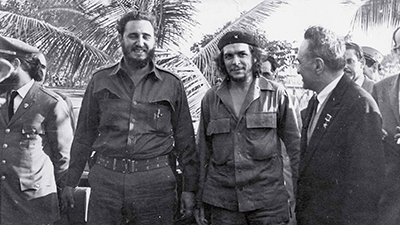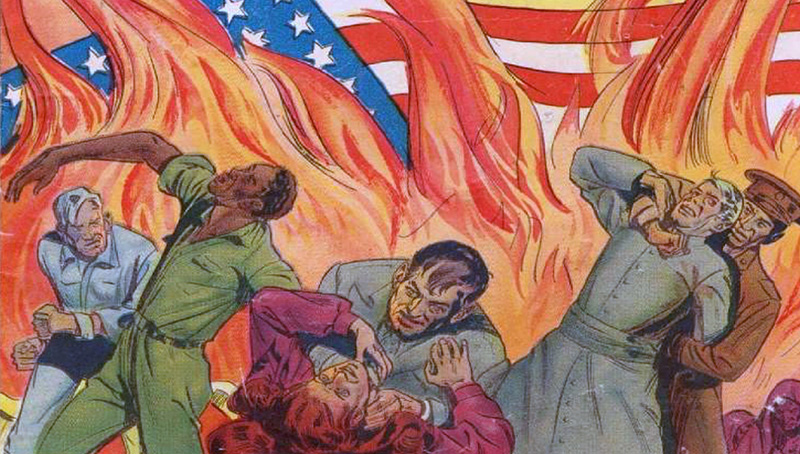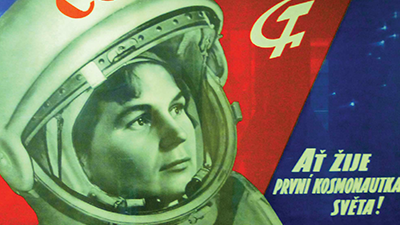Effects of the Cold War
Teacher Resources
Driving Question: What tactics did the United States and the Soviet Union use to compete for influence, and what were the consequences of their actions?
The Cold War and decolonization took place at the same time. The United States and the Soviet Union competed to influence a growing number of newly independent states, interfering in and shaping emerging regional conflicts around the world. Though the Soviet Union eventually fell, the global legacy of Cold War conflicts still lives on.
Learning Objectives
- Compare the ways in which the United States and the Soviet Union sought to maintain influence over the course of the Cold War.
- Use quick-sourcing skills to assess the impacts of the Cold War.
Vocab Terms:
- balance of power
- coup
- dictatorship
- intervention
- non-alignment
- self-determination
- socialism
Opener: Effects of the Cold War
To teach this lesson step, refer to page 3 of the Lesson 8.3 Teaching Guide.
The Cold War was about many other nations besides the two superpowers. As you get ready to tour the global Cold War, consider the perspective of a smaller nation.
The Cold War Around the World
To teach this lesson step, refer to page 3 of the Lesson 8.3 Teaching Guide.
The Cold War certainly ran “hot” in regional wars around the world. What led to the worldwide flare-ups during this fifty-year conflict?
-
Guiding Questions
-
Before you read
Preview the questions below, and then skim the article. Be sure to look at the section headings and any images.
While you read
Look for answers to these questions:
- Why was there so much bloodshed in South Asia in the late 1940s, and how did the British government try to contain the violence?
- How did the partition of South Asia influence the Cold War in that region?
- How did the United States try to contain communism in Latin America? Where did they fail?
- Why was the United States so interested in preventing communism in the former Belgian Congo?
After you read
Respond to the following questions:
- Using evidence from this article, compare the ways in which the United States and the Soviet Union sought to maintain influence over the course of the Cold War.
- This article points out that the United States frequently intervened in other countries during the Cold War, often to stop socialist reformers. Why do you think that communist and socialist ideas were so appealing to so many people in newly independent nations in Asia, Africa, and Latin America?
Source Collection: Cold War
To teach this lesson step, refer to page 4 of the Lesson 8.3 Teaching Guide.
Getting Hung up on Quick Sourcing Note Cards? Get unstuck by reading this Community Forum thread.
Examine a variety of sources that describe the emergence and intensification of the Cold War. We recommend you use the Quick-Sourcing Tool to complete this exercise.
Decolonization and Cold War: Through a Caribbean Lens
To teach this lesson step, refer to page 5 of the Lesson 8.3 Teaching Guide.
The cold war was more than the USSR vs the USA. Read more about incorporating global perspectives in the Community thread Cold War – Beyond USSR and USA.
The Caribbean provides a case study of how decolonization and the Cold War were intertwined. Explore how both these trends impacted the region.
-
Guiding Questions
-
Before you watch
Preview the questions below, and then review the transcript.
While you watch
Look for answers to these questions:
- What was colonialism like in the Caribbean during the second half of the twentieth century?
- Why did the Cuban Revolution start, and why did Castro align himself with the Soviet Union?
- How did Puerto Ricans resist their status as a territory under US control?
- How has Puerto Rico’s status as a territory (rather than a state) affected people living on the island?
- How did other nations in the Caribbean learn from the example of the successful Cuban Revolution?
After you watch
Respond to the following questions:
- Using evidence from this video, compare the ways in which the United States and the Soviet Union sought to maintain influence over the course of the Cold War.
- People in the Caribbean were resisting a different sort of colonialism than most of the other examples you have encountered so far. Do you think the story of the Caribbean’s encounter with the Cold War and decolonization is different than it was for people in Africa and Asia? Why or why not?
Key Ideas
Decolonization and Cold War: Through an Asian Lens
To teach this lesson step, refer to page 6 of the Lesson 8.3 Teaching Guide.
Check out the OER Project Video Guide to help you incorporate best practices when using video as part of your teaching.
The Korean and Vietnam Wars are perhaps the best-known “hot” conflicts of the Cold War. The roots of both conflicts lay in the colonial era, and in both conflicts, the United States and Soviet Union supported different sides.
-
Guiding Questions
-
Before you watch
Preview the questions below, and then review the transcript.
While you watch
Look for answers to these questions:
- This video argues that the Korean and Vietnam wars had their roots in the era of colonialism. What events in particular does this article trace these conflicts back to?
- In both Korea and Vietnam, there were well-known local leaders of the communist and anti-communist sides. What were the names of these four leaders? Despite their differences, what did they have in common?
- In what ways was the civil war in Vietnam a decolonization struggle and also a Cold War conflict?
- How was Korea’s decolonization and its encounter with the Cold War conflict different from Vietnam’s? How was it similar?
- How does Steve Lee explain the outbreak of war in Korea?
- How did the Vietnam War end?
After you watch
Respond to the following questions:
- Using evidence from this video, compare the processes by which various peoples pursued independence after 1900.
- Would you call the Korean War a “Cold War” episode or a war of decolonization? What about the Vietnam War? Defend your answers.
Key Ideas
Closer: Effects of the Cold War
To teach this lesson step, refer to page 8 of the Lesson 8.3 Teaching Guide.
How would you rank the legacies of the Cold War? Take a stand and use evidence to support your decisions.
Arms Race, Space Race
To teach this lesson step, refer to page 8 of the Lesson 8.3 Teaching Guide.
Competition can be destructive or inspire people to greater heights. During the Cold War, the competition between the United States and the Soviet Union was no exception.
-
Guiding Questions
-
Before you read
Preview the questions below, and then skim the article. Be sure to look at the section headings and any images.
While you read
Look for answers to these questions:
- What was the arms race?
- What does the acronym MAD stand for?
- What was the Cuban Missile Crisis and what effect did it have on international relations?
- How was the space race connected to the arms race?
After you read
Respond to these questions: This is an article about a nuclear arms race. Yet, the author concludes with a hopeful note about the space race. Do you agree with this conclusion? What evidence can you present that the arms race and space race led to new opportunities for international cooperation? What evidence challenges this conclusion? What other evidence would you need to support your argument?





